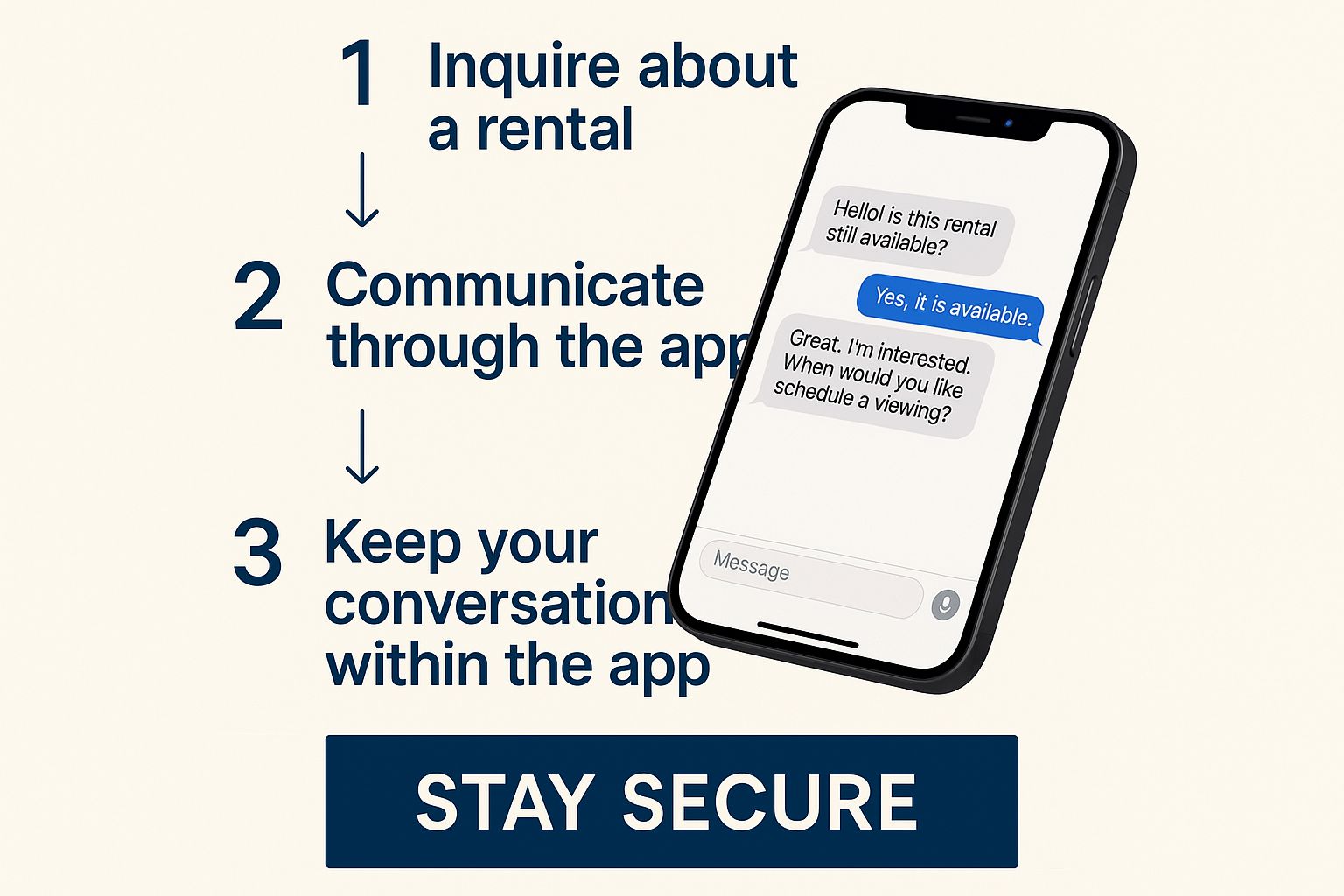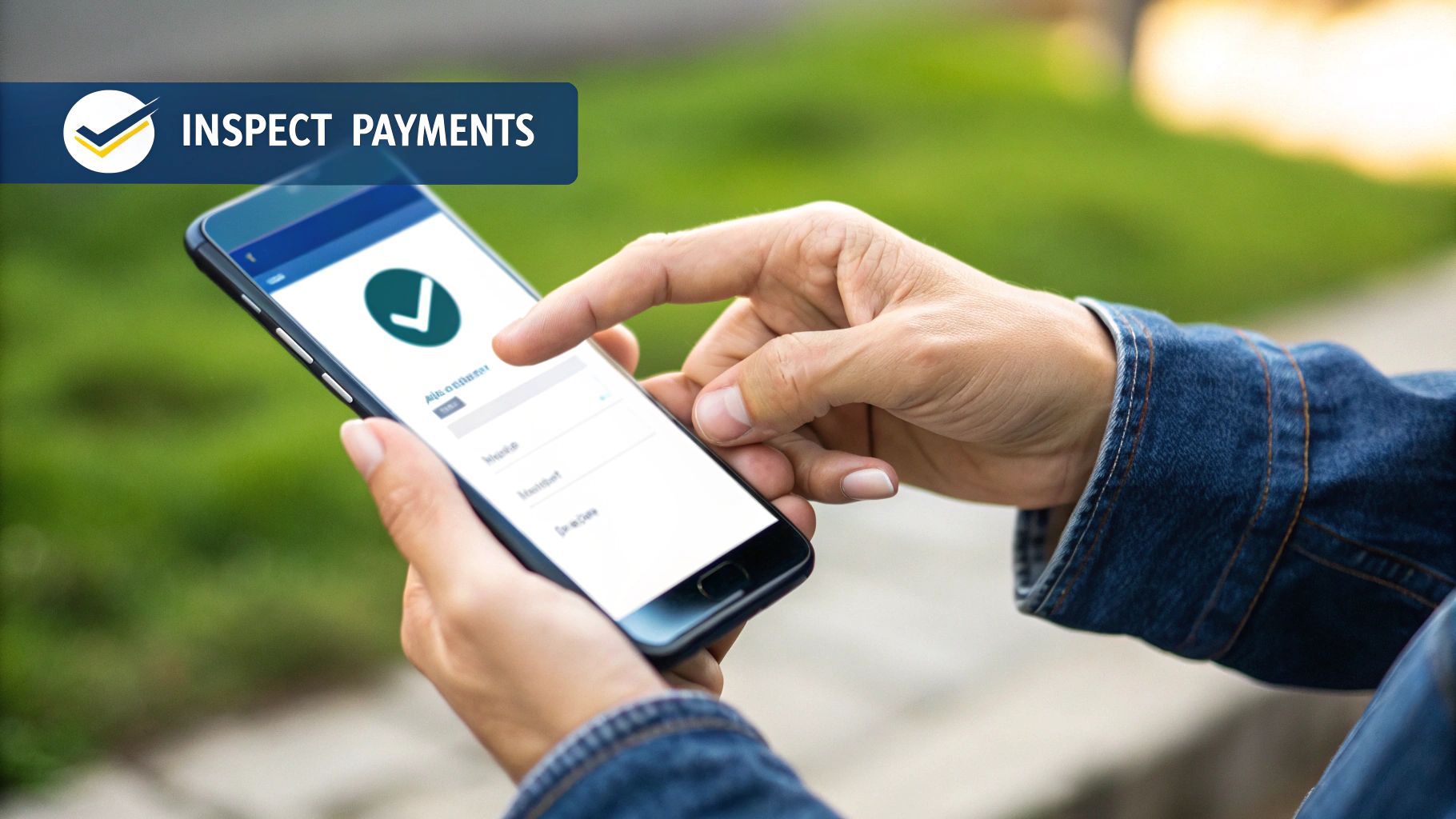How to Avoid Rental Scams: Top Tips to Protect Yourself
- fantasma70
- Jul 31, 2025
- 11 min read
Look, if you want to dodge rental scams today, you have to do more than just follow old-school advice. The game has changed. The single most important rule is to verify everything before you even think about paying a dime. It's about spotting the subtle red flags and learning to walk away from high-pressure tactics, no matter how good the deal seems.
Understanding Modern Rental Scams

Let's be real—the rental market is a jungle, and the scammers lurking in it are getting alarmingly good at what they do. Sure, the classic "I'm out of the country on a mission trip" excuse still pops up, but the new scams are way more sophisticated. They're using technology to build a smokescreen of legitimacy.
This means you need a new strategy. We're not just dealing with clumsy opportunists anymore. These are often organized operations using slick tools to trick you.
The New Wave of Digital Deception
Today's scammers have technology on their side, making it incredibly difficult to tell a real listing from a fake one. I've seen it all—they use AI to write perfect, eloquent listing descriptions and even to create phony utility bills or IDs to "prove" they own the place.
Most of these scams boil down to a few common plays:
Phantom Rentals: These are the ghost ships of the rental world. The property either doesn't exist at all or isn't actually for rent. Scammers just lift beautiful photos from other listings to hook you.
Hijacked Ads: This one is sneaky. A fraudster will find a legitimate rental ad, copy everything, but swap the contact info with their own. They intercept your messages and, ultimately, your money.
Bait-and-Switch Schemes: The apartment is real, but you're not getting what you saw online. They'll show you gorgeous photos of a pristine, renovated unit. After you've paid the deposit, you get the keys to a place that's falling apart.
The Numbers Behind the Threat
This isn't just a niche problem; it's everywhere. Rental application fraud is booming because technology makes it so easy to fake documents. A recent analysis of almost 5 million rental applications was eye-opening. It found that 6.4% of them contained manipulated data. That’s over 80,000 fraudulent documents a year in North America alone. To see the full breakdown, you can review the complete findings on how AI is reshaping rental scams.
My goal here isn't to make you paranoid, but to make you prepared. Once you understand the risks, you can start your search with the right mindset—a healthy mix of skepticism and confidence. That’s your best defense, especially when the pressure is on in a competitive market.
It all starts with trusting your gut. If you get a weird feeling about a rental listing or a conversation with a supposed landlord, don't ignore it. Learning to spot the warning signs early is your best defense against getting scammed, saving you time, money, and a whole lot of stress.
The biggest and most obvious giveaway is a price that just doesn't make sense. See a stunning two-bedroom apartment in a sought-after neighborhood listed for 50% less than everything else? That’s not a lucky break; it’s almost certainly a trap. Scammers know we all love a good deal, and they use these fake low prices to lure you in, hoping you'll ignore all the other red flags.
Don't Fall for High-Pressure Tricks
Scammers are experts at creating a sense of false urgency. They’ll hit you with lines like, “I’ve got five other people ready to put down a deposit right now, so you need to decide in the next hour.” This is a classic tactic meant to rush you into making a bad decision without thinking things through.
Real landlords and property managers understand that this is a big decision. They'll give you a reasonable amount of time to consider it. Anyone pushing you to act immediately is probably trying to get your money before you discover their scam.
Key Takeaway: The moment you feel rushed to sign a lease or send money, stop. A legitimate rental will still be available after you’ve had a chance to do your homework.
These pressure tactics are often paired with a sob story. The "landlord" might tell you they're out of the country for missionary work or are deployed in the military. This conveniently explains why they can't meet you in person or show you the property. It's their excuse to demand a wire transfer for a deposit before you've even seen the place, with a hollow promise to mail you the keys.
Sadly, these tricks work far too often, especially when people are desperate to find a place. In fact, research shows that about 55% of rental scam victims were hooked by an unbelievably low price, and 52% were pressured by claims of immediate availability. You can learn more about how scammers exploit renters in competitive markets to understand the full scope of the problem.
Let's break down some of the most common red flags you'll encounter.
Common Rental Scam Red Flags
This table highlights some of the most frequent warning signs of a rental scam. Think of it as a quick checklist to run through whenever you're evaluating a potential rental.
Red Flag | What It Likely Means |
|---|---|
Price Too Good to Be True | The listing is likely fake, designed to attract as many potential victims as possible with an unrealistic price. |
High-Pressure Tactics | The "landlord" wants your money before you have time to verify their identity or the property's legitimacy. |
Refusal of In-Person Tours | The person doesn't actually have access to the property. They've likely stolen photos from a legitimate listing. |
Demand for Wire Transfers | They want you to use an untraceable payment method. Once the money is sent, it's nearly impossible to get back. |
Vague or Stock Photos | The images are probably stolen. A legitimate landlord will have multiple, recent photos of the actual unit. |
Poor Grammar & Spelling | This can be a sign of a scammer operating from overseas, though not always a definitive indicator on its own. |
Recognizing these signs is the first step. The next is knowing what to do about them.
Always push for a live, interactive video tour if you can't see the property in person. If they refuse or only offer a pre-recorded video, it's time to walk away. You should also be skeptical of listings filled with generic, catalog-style photos. A quick Google reverse image search can instantly tell you if those pictures have been lifted from another listing or a real estate website.
How to Properly Vet a Listing and Landlord
So, you've found a rental that looks good and hasn't tripped any of your initial scam alarms. Great! Now it's time to put on your detective hat. A little proactive digging at this stage can save you a world of hurt and financial loss down the road.
Let's start with verifying the owner. This sounds more complicated than it is. Most city or county governments have public record websites where you can look up property information. Just plug in the address and see what name comes up. If the person you're talking to isn't the owner on record, you need to find out why.
The Importance of Seeing the Property
I can't stress this enough: never, ever rent a place sight-unseen. This is the golden rule. If you're local, go see it in person. If you're not, demand a live video tour. Scammers using stolen photos can't walk you through a property they don't have access to. It's that simple.
A few more quick digital checks can also work wonders:
Reverse Image Search: Drag the listing photos into a Google reverse image search. You'll quickly see if those same pictures have been used on old real estate listings or for a completely different property.
Google the Address: Do a simple search for the property address. Does another rental company have it listed? Is it actually for sale, not for rent? Conflicting information is a massive red flag.
A legitimate landlord or property manager expects you to do your homework. They won't have a problem with these requests. The ones who get defensive or try to rush you are the ones you need to worry about. Trust your gut.
Now, let's talk about keeping your communications secure while you sort all this out.

As the infographic shows, keeping your conversations on a secure platform or in a single email thread is just smart practice. It creates a digital paper trail you can refer back to. If something goes wrong, that documentation is your best friend.
Keeping Your Money and Information Secure

Protecting yourself when you're looking for a rental boils down to two key things. First, you need to be sure the property is legit. Second, and just as important, you have to be incredibly careful with your money and personal details. This is often where a clever scammer can catch you off guard.
Let's start with the absolute golden rule: never use untraceable payment methods. If a supposed landlord pressures you to pay a security deposit with a wire transfer, cash, or—believe it or not—gift cards, you've found a scam. That’s a guarantee.
Scammers love these methods for one simple reason: once you send the money, it vanishes without a trace. There's almost no way to get it back.
How to Pay Safely
Always, and I mean always, stick to secure payment methods that give you some recourse if things go south. Any legitimate property manager or landlord will have standard, professional ways for you to pay.
Here are your safest bets:
Credit Cards: This is your best friend. Credit cards come with strong fraud protection, making it straightforward to dispute a charge if you get ripped off.
Official Rental Platforms: Reputable sites like Zillow or Apartments.com often have built-in, secure payment systems. If they offer it, use it.
Checks or Bank Transfers: While not as ironclad as credit cards, these methods still create a direct paper trail from your account to theirs.
If someone refuses these common options and insists on something else, that's more than just a red flag—it's a giant, flashing warning sign. A real business doesn't operate on a cash-only basis for a transaction as significant as a rental deposit.
Here’s a good rule of thumb: If the payment method feels more suitable for sending a birthday gift to your cousin than for a professional transaction, it's time to walk away.
Guarding Your Personal Data
Your money isn't the only thing scammers are after. Your personal information is pure gold to them. Be stingy with it.
A "landlord" asking for your Social Security number or bank account information before you've even laid eyes on the apartment or signed a lease is a classic scam tactic. Don't fall for it.
That kind of sensitive information should only be shared after you have a legally binding lease agreement in hand. Handing it over too soon is an open invitation to identity theft. The real application process happens once you've confirmed the property and the landlord are legitimate—never before.
That sinking feeling in your stomach when you realize it was all a scam is just awful. But what you do in the next few minutes and hours is what really counts. Take a deep breath. Instead of panicking, focus on taking these clear, decisive steps to limit the damage.
Your very first move should be to cut off the money. If you paid with a credit card, call the number on the back right away and tell them to dispute the charge as fraudulent. For a debit card, wire transfer, or a payment app like Zelle or Venmo, the process is tougher, but you still need to report the fraud to the bank or service immediately. It's your best shot at getting the money back.
Taking Official Action
Once you've tried to secure your money, the next step is to create a paper trail. Making an official report is crucial—not just for your own potential recovery, but to help law enforcement track these criminals and stop them from duping someone else.
File a Police Report: Head down to your local police station and file a formal report. Bring every piece of evidence you have: printouts of emails, screenshots of text messages, the phony lease agreement, and any transaction receipts. Make sure you get a copy of the report for your own records.
Report it Federally: The Federal Trade Commission (FTC) is the main agency that collects reports on scams. Go to ReportFraud.ftc.gov and file a complaint. They use this data to identify patterns and build cases against these operations.
Alert the Listing Platform: Where did you find the ad? Go back to that site—whether it was Facebook Marketplace, Zillow, or another rental platform—and report the listing as fraudulent. Getting the fake ad removed quickly can prevent the next person from falling into the same trap.
Remember, these scams prey on your sense of urgency and your need to find a place quickly. This isn't a new problem, but it exploded during the pandemic as more people faced tough financial situations.
It's a startling fact, but from February to August 2020, fraudulent rental applications more than doubled, jumping from 15% to a staggering 29%. In that same period, 85% of landlords reported they had been victims of rental fraud. You can dig deeper into these tenant fraud statistics and their impact.
By taking the time to report the scam, you’re doing more than just helping yourself. You're playing a vital role in making the rental market safer for everyone and giving authorities the information they need to shut these criminals down for good.
Your Top Questions Answered
Let's tackle some of the most common questions people have when they're trying to rent a car without getting taken for a ride. Think of this as your quick-reference guide for those moments when something just doesn't feel right.
Should I Pay a Deposit Before I See the Car?
Absolutely not. This is a huge red flag. A legitimate rental company, big or small, will never ask you to pay a deposit or the full rental fee just to "hold" a car you haven't even seen or for a booking you haven't finalized through a proper channel. Scammers love this tactic because once you send the money, they disappear, and so does the non-existent car.
Always complete the booking through an official website or in person. A signed rental agreement should be in your hand (or your inbox) before any significant amount of money is charged. This isn't just a suggestion; it's the only way to protect yourself.
What If the "Agent" Says They're Off-Site or Working Remotely?
Be extremely careful. This is a classic scammer excuse. They might cook up a story about being a private owner traveling abroad or an "agent" who will have the car delivered after you wire the payment. They'll sound convincing and create a sense of urgency, promising to ship you the keys or have someone meet you after you pay.
The bottom line: Never rent from an individual or a "company" that can't provide a clear, verifiable process for picking up the car from a physical location or a designated airport counter. An owner who can't meet you or have a verified local partner handle the exchange is almost certainly running a scam.
Are Listings on Comparison Sites Always Safe?
While major platforms like Kayak or Rentalcars.com have safeguards, they aren't totally scam-proof. Determined criminals can sometimes slip through the cracks with fake company profiles or cloned listings that look real. No matter where you find the deal, you still need to do your own homework.
Check the source: Does the rental company have its own professional website with real reviews and a physical address? A quick Google search can tell you a lot.
Pay securely: Always use the comparison site’s secure payment portal or the rental company's official payment system. If they push you to pay through a wire transfer, Zelle, or a cash app, walk away.
Report suspicious listings: If you spot a deal that's too good to be true or an "agent" using high-pressure tactics, report it to the platform. You could save someone else a lot of trouble.
How Can I Tell If the Rental Agreement Is Real?
A real rental agreement is a detailed contract, not a sloppy one-pager. Be suspicious of any document full of typos, vague terms, or missing crucial details like the company's full name, address, and the car's license plate number.
It should clearly spell out the total cost, insurance coverage, mileage limits, and fuel policies. If you feel unsure, don't sign it. A scammer's "contract" is often a poorly copied document meant to look just official enough to trick you into paying.
When your Miami trip requires a vehicle, you need a partner you can trust. Cars4Go Rent A Car offers transparent pricing, no hidden fees, and the convenience of having your car delivered right to you. Book your ride with confidence at https://www.cars4go.com.



Comments